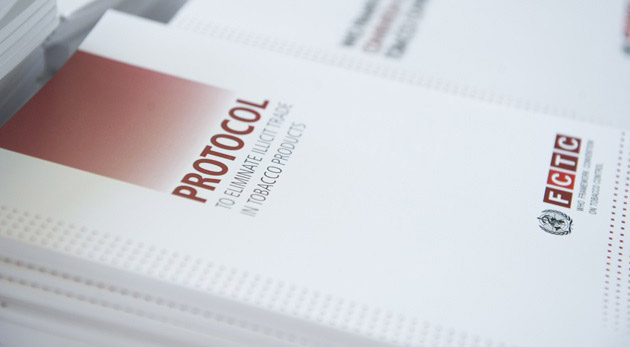Saudi Arabia's tax stamp project boosts regulatory controls and curbs illicit tobacco trade

Context
Saudi Arabia ratified the WHO Framework Convention on Tobacco Control (FCTC) on 9 May 2005. The country took early action in combating illegal trade by establishing a committee to examine illicit trade in tobacco products, as directed by a decision from the Cabinet in 2009. In 2012, the Conference of the Parties to the WHO FCTC adopted the Protocol to Eliminate Illicit Trade in Tobacco Products, which was ratified by Saudi Arabia in 2015.
Initiative
To support the objectives of the WHO FCTC and take action in combating illegal trade, the Saudi Arabian Cabinet issued a resolution in 2014. This resolution authorized the Minister of Health or their representative to sign the Protocol to Eliminate Illicit Trade in Tobacco Products. Subsequently, in 2015, the Shura Council approved Saudi Arabia's participation in the Protocol, recognizing its potential impact on reducing national tobacco use and promoting regional collaboration in curbing the sale and circulation of illicit tobacco products. As a result, Saudi Arabia ratified the Protocol in 2015.
The National Tobacco Control Committee, representing the Ministry of Health, published an informational booklet about the Protocol to Eliminate Illicit Trade in Tobacco Products. In the same year, the activities for World No Tobacco Day were dedicated to raising awareness among the public about the Protocol.
Additionally, Saudi Arabia introduced a tax stamp project for tracking tobacco products, led by the General Authority for Zakat and Income Tax. This system utilizes tax stamps affixed to imported tobacco products, with the distribution or importation of any tobacco products lacking tax stamps being prohibited.
A tax stamp is a distinctive symbol, such as a sticker or encoded digital data, applied to specific products. The stamp is requested, printed and monitored through a tracking programme. Producers and importers must comply with the tax stamp system's specified standards to import and offer these products in the market.
In November 2019, the General Authority for Zakat and Income Tax announced a ban on the sale and distribution of cigarette packages without tax stamps. This decision was based on the executive regulations of the selective tax system, specifically regarding tax stamps, within the framework of the unified agreement for selective tax in countries of the Gulf Cooperation Council.
To assist consumers, the General Authority for Zakat and Income Tax developed a mobile application called "verify” (تحقق). This application allows users to verify the presence of tax stamps by scanning the barcode on cigarette packages. The authority encourages consumers to report illicit products through their official website, the hotline (19993) or the "verify" (تحقق) application.
Impact
The implementation of the tax stamp system in Saudi Arabia has had several notable impacts, including:
Strengthening regulatory controls. The tax stamp system has enabled Saudi Arabia to establish effective regulatory controls for collecting selective goods tax on imports. This ensures that all necessary taxes and fees are duly collected in a systematic and legitimate manner.
Ensuring legitimate product entry. The tax stamp system provides a systematic and legitimate means of verifying the entry of products into Saudi Arabia. This helps prevent illicit trade and ensures that all applicable taxes and fees are properly collected.
Enhancing analysis and auditing capabilities. The tax stamp system has improved the ability of relevant authorities to analyze and audit imported products. This enables them to identify instances of illicit trade in these products and develop strategies to minimize and mitigate such practices as much as possible.
Next steps
Moving forward, as of 24 February 2020, the importation of waterpipe products without tax stamps will be prohibited. Additionally, starting from 18 May 2020, the sale and trade of any waterpipe product lacking tax stamps will be forbidden within Saudi Arabia. Saudi Arabia remains committed to promoting and encouraging other countries in the Region to ratify the Protocol to Eliminate Illicit Trade in Tobacco Products, fostering ongoing cooperation in this regard.
References
MPOWER measures to reduce demand for tobacco
Protocol to Eliminate Illicit Trade in Tobacco Products
WHO Framework Convention on Tobacco Control
Story originated in 2019.
Saudi Arabia: offering help to quit tobacco use

Context
In 2005, Saudi Arabia ratified the WHO Framework Convention on Tobacco Control (FCTC). By 2010, approximately 15% of adolescents reported being current tobacco users. However, health care providers faced significant challenges in assessing and treating smokers due to various barriers. It was crucial to tackle the lack of knowledge and tools necessary for rapid and simple evaluation of tobacco use and the treatment of tobacco dependence. Furthermore, there was a shortage of institutional support for the routine assessment and treatment of tobacco use, resulting in limited training opportunities for tobacco cessation interventions. To enhance the ability of health care providers to address all tobacco users, not just cigarette smokers, extensive efforts were undertaken to integrate tobacco cessation interventions into the existing healthcare system, aiming for a successful strategy implementation.
Initiative
To comply with the guidelines outlined in Article 14 of the WHO FCTC, the Ministry of Health, represented by the National Tobacco Control Committee, enhanced the tobacco cessation guidelines in Saudi Arabia. Starting in 2011, the Ministry initiated the establishment of specialized tobacco cessation clinics, with a total of 262 clinics currently in operation. By integrating these clinics into existing healthcare sectors and ensuring accessible treatment services, the Ministry aimed to deliver a uniform and high-quality standard of care. This clinic project has been expanded to cover all regions within the Saudi Arabia. Additionally, the Ministry launched the '937' hotline for cessation support and developed electronic mobile applications to provide access to cessation services.
Concurrently, the Ministry of Health conducted training programmes for healthcare providers to introduce the new treatment programme, which incorporated both behavioural and therapeutic components. They also introduced online training known as the 'Saudi Certificate for Tobacco Treatment'. In order to offer free, high-quality treatment and preventive services, the Ministry collaborated with the ministries of education, transport and interior as well as the Saudi Food and Drug Authority. These services were made available through 274 hospital clinics, 321 primary healthcare centers, 890 fixed cessation clinics, 100 mobile cessation clinics, 283 home care services and 14 specialized hospitals.
Challenges and lessons learnt
One of the primary challenges faced was the shortage of medical personnel. From this experience, an important lesson learnt was the implementation of an electronic training course offered during official working hours by the General Authority for Medical Specializations. Furthermore, in cases where treatment services were unavailable in the clinic, a shift towards emphasizing awareness and educational aspects of cessation interventions was advised. Utilizing social media platforms proved beneficial in promoting the tobacco cessation programme. Notable successes included:
Equipping physicians and other healthcare providers with the necessary skills and knowledge through training on the smoking cessation programme based on the Saudi manual for cessation services.
Developing a specialized course, the 'Saudi Certificate for Tobacco Treatment' aimed at training physicians to become experts in treating tobacco dependence.
Assisting a significant number of smokers who desired to quit by providing comprehensive behavioural and pharmaceutical treatment services.
Utilizing electronic applications that not only focused on smoking cessation but also assessed user satisfaction with the provided services, as well as serving as a platform for registering clinic auditors.
Enhancing health literacy and awareness of preventive services among the population.
Establishing a tobacco control complaint system and implementing an effective mechanism for handling incoming notifications.
Impact
The development of tobacco cessation clinics has led to their expansion into comprehensive hospital centers, incorporating educational, treatment and control departments. The total number of clinics has notably increased from 461 in 2018 to 1008 in 2019. Similarly, the number of clinic auditors has experienced substantial growth, rising from 51 000 in 2018 to 96 500 in 2019.
Next steps
With an emphasis on community partnerships, the project aims to further expand the provision of tobacco cessation services through collaborations with nongovernmental organizations, private hospitals and malls. Additionally, the Ministry of Health will continue to encourage the utilization of existing services, such as the '937' hotline, the registration of clinics in the ‘appointment’ (موعد) application, and the electronic health information system, to actively contribute to tobacco control efforts.
References
Global Tobacco Surveillance System
MPOWER measures to reduce demand for tobacco
WHO Framework Convention on Tobacco Control
Story originated in 2019.
Saudi Arabia: enforcing bans on tobacco advertising, promotion and sponsorship

Context
Saudi Arabia ratified the WHO Framework Convention on Tobacco Control (FCTC) on 9 May 2005. In an effort to restrict tobacco advertising, promotion and sponsorship, the country has implemented various regulations. However, certain areas remained unaddressed, including the promotion and advertising of tobacco products on national and international television, radio, movies, billboards and the internet. Additionally, the distribution of free tobacco products, promotional discounts, brand sharing and brand stretching were not prohibited. Furthermore, sponsorship and corporate social responsibility initiatives by tobacco companies were not restricted.
Initiative
As a measure to acknowledge the risks associated with tobacco advertising, promotion and sponsorship, Saudi Arabia introduced a Royal Decree in 2017. This decree has positioned Saudi Arabia at the forefront of countries actively enforcing bans on all forms of tobacco advertising, promotion and sponsorship, as confirmed by the WHO Report on the Global Tobacco Epidemic of 2019. The legislation, particularly Article 10 and its accompanying executive regulations, explicitly prohibit any form of direct or indirect tobacco advertising, promotion or sponsorship across various media channels within Saudi Arabia. This includes audio, visual and print media as well as electronic platforms and websites. Furthermore, any depiction of tobacco use or related products must be removed from films, television series, programmes, print materials (including electronic versions) and any content that could potentially encourage smoking in Saudi Arabia.
The regulations stipulate that individuals or entities found in violation of these provisions may face a fine of at least 5000 Saudi Arabian Riyals or more. Additionally, the Ministry of Commerce has established a dedicated department responsible for monitoring compliance with the ban on tobacco advertising, promotion and sponsorship across all media channels, such as newspapers, radio, television, films, series and various electronic platforms.
Challenges and lessons learnt
Monitoring electronic commerce poses a significant challenge, particularly in overseeing the multitude of sales platforms, especially those reliant on individual sellers like Instagram and similar platforms. To address this issue, the Ministry of Commerce has established a dedicated team specifically trained for this purpose. The National Tobacco Control Committee conducts regular training and development programmes for field teams to effectively handle the various violations outlined in the executive regulations of the tobacco control system. An additional measure is the use of the National Tobacco Control Committee's application, which enables consumers to report violations, subsequently allowing investigators to process these notifications.
Impact
The precise assessment of the ban's direct impact has not been measured. However, the National Tobacco Control Committee, in collaboration with the ministries of commerce and culture, and the Communications and Information Technology Commission, assumes the responsibility of overseeing the effective implementation of the ban on tobacco advertising, promotion and sponsorship. The control team under the National Tobacco Control Committee is tasked with identifying violators and imposing fines in accordance with the regulations, while also ensuring the removal of any violations encountered.
Next steps
Moving forward, the National Tobacco Control Committee is committed to regularly revising the regulations to address any potential loopholes that tobacco companies may exploit. Furthermore, the committee aims to enhance notification systems and strengthen mechanisms for identifying and apprehending violators of the tobacco control measures.
References
MPOWER measures to reduce demand for tobacco
WHO Framework Convention on Tobacco Control
WHO Report on the Global Tobacco Epidemic 2019
Story originated in 2019.
Egypt: protecting people from tobacco smoke

Context
In the late seventies, there was widespread exposure to second-hand smoke in Egypt, leading to increased disability and premature death related to smoking. Urgent action was required to control the smoking epidemic through legislative measures. Egypt implemented various initiatives in three phases of legislation development and adoption in 1981, 1993 and 2002, which incorporated most of the demand-side measures of the WHO Framework Convention on Tobacco Control (FCTC), even before Egypt's official ratification on 25 February 2005. However, certain gaps remained in relation to each measure.
The initial tobacco control legislation was enacted in Egypt in 1981, marking a significant milestone achieved by the parliamentary health committee, led by a dedicated cardiologist. This law prohibited smoking in public transportation and both open and enclosed public spaces. However, the specification of these public places was left to the discretion of the Minister of Health. Violations of the law carried penalties, including imprisonment for up to one week and fines ranging from EGP 5 to EGP 20, or both. Additionally, the Labour Law 1981/137 prohibited smoking during work hours or in workplaces, outlining administrative penalties for violators. Furthermore, the Environmental Affairs Law 1994/4 prohibited smoking in public transportation and emphasized the responsibility of establishment managers to prohibit smoking in enclosed public areas, though with the requirement of designated smoking spaces.
Despite the health committee's efforts, an attempt in 1993 to pass legislation that banned all forms of tobacco advertising in the country was thwarted and undermined due to strong interference from the tobacco industry.
Initiative
Following Egypt's ratification of the WHO FCTC, Law 2007/154 was issued to explicitly highlight the country's commitments under the Convention and amend certain provisions of Law 1981/52. The updated law designated specific public places as smoke-free, including healthcare, educational and governmental facilities, social and sports clubs, and youth centers, with additional places to be determined by the Minister of Health. However, the law and bylaw did not extend to cover restaurants and cafes. Penalties for establishment managers were increased to EGP 1000 to EGP 20 000, while smokers faced fines of EGP 50 to EGP 100. The Minister of Health signed the Executive Bylaw 2010/291 of 1981/52 in 2010, providing clear definitions of closed public places where smoking is prohibited and addressing public transportation. Establishment managers were made responsible for displaying visible no smoking signs, particularly at entrances, indicating the smoking prohibition and the legal consequences for violations.
Several initiatives were implemented to enhance the enforcement of smoke-free provisions. Collaborating with the Ministry of Health and Population, WHO and the International Union Against Tuberculosis and Lung Disease, the National Guidelines for Implementation of Smoke-Free Policies were developed, outlining the implementation procedures in workplaces, healthcare facilities and educational institutions. Additionally, an Initiative for Smoke-Free Health Care Facilities, in partnership with selected nongovernmental organizations, organized two training-of-trainers workshops to educate tobacco control focal points and healthcare facility managers across all governorates. Furthermore, the Smoke-Free Cities Initiative received support from two grants from the Bloomberg Initiative in 2010, focusing on three Egyptian cities (Alexandria, Port Said and Luxor). However, due to the Egyptian Revolution in 2011, the initiative was not fully completed.
Challenges and lessons learnt
In the past, tobacco control efforts faced sustainability challenges due to inadequate funding and limited political support. However, more recently, tobacco control has been integrated into the Presidential 100 Healthy Lives Initiative, offering some hope for sustained efforts. Despite this, tobacco use remains widely accepted within social norms. Challenges persist in achieving high compliance with smoke-free policies, as the enforcement of Egypt's smoke-free law lacks strictness. Certain indoor private workplaces, shopping malls, airports and other public places still permit designated smoking areas. According to the WHO Report on the Global Tobacco Epidemic of 2019, compliance with smoke-free provisions is notably low, scoring 3 out of 10, particularly in governmental facilities, including healthcare and educational establishments. Public transportation shows relatively higher compliance (7 out of 10), largely due to strict enforcement in the underground. The tobacco control law does not explicitly prohibit designated smoking rooms or areas in certain indoor public spaces, such as offices, workplaces and airports. Restaurants and cafes are not covered by the smoke-free law.
The national law does not allocate specific funds for enforcement. Although Law 2007/174 and Executive Bylaw 2010/291 of 1981/52 outline the responsibility of law enforcement personnel, the Tobacco Control Department faces practical challenges in executing these provisions due to limited staff (only 3 members) and the inability to conduct regular nationwide enforcement campaigns. Currently, the Ministry of Interior is responsible for enforcement, responding to complaints and collecting fines, but regular inspections of smoke-free places are not conducted unless prompted by a report or complaint. Collaboration protocols exist between the Ministry of Interior, the Ministry of Health and Population, and the Consumer Protection Agency. However, the coordination between the Tobacco Control Department and various departments within the Ministry of Interior is currently not functioning effectively.
Key lessons learnt from this initiative underscore the importance of local collaboration among different government agencies and international collaboration with funding partners to advance tobacco control measures. It is evident that enforcement of smoke-free legislation is achievable and has been successful in specific settings, such as underground stations, cinemas, airports, select governmental institutions and some private companies.
Impact
The objectives of the tobacco control strategy are to annually decrease the prevalence of current tobacco use among adults by 1% and among youth by 2%, as well as to reduce exposure to second-hand tobacco smoke in public places by 1%. The impact on adult tobacco use and exposure to second-hand smoke in public places appears to be either absent or minimal. However, there has been a decline in tobacco use prevalence among youth, dropping from 15.8% in the Global Youth Tobacco Survey of 2001 to 12.0% in the Global Youth Tobacco Survey of 2009, indicating an indirect influence of the smoke-free policy. Inconsistencies in enforcing the law may be a contributing factor to this outcome.
Next steps
To challenge the normalization of tobacco use, it would be beneficial to establish alternative channels of communication with civil society, female social agents in rural areas (Raaedat Reefeyat) and media personnel. Engaging in a societal dialogue about law enforcement can help raise awareness about the rights of non-smokers in smoke-free environments. This approach may bring together various parties and form coalitions to rejuvenate tobacco control efforts in Egypt. Additionally, it may be effective to raise awareness in educational facilities, healthcare facilities, dental clinics and family medicine centers. For example, educating children in schools, along with their teachers and parents, to become advocates for smoking control and prevention. This can be achieved through collaboration between the ministries of education and higher education and research to update and incorporate awareness programmes into student curricula.
Other steps to enhance compliance with and enforcement of Egypt's smoke-free law include:
Updating legislation on smoke-free places to broaden coverage and compliance by maintaining regular communication with the health committee of the Egyptian parliament.
Enforcing the existing Ministry of Health and Population’s National Guidelines for Implementation of Smoke-Free Policies in all healthcare and educational facilities, workplaces and closed public spaces. This requires collaboration between the Ministry of Health and Population, Ministry of Interior, Ministry of Education and Ministry of Higher Education and Research. The police and authorized inspectors of the Ministry of Health and Population should integrate tobacco control enforcement activities into their routine operations.
Raising awareness through the development of an effective campaign that utilizes traditional broadcast media and emerging digital platforms such as SMS, websites and social media tools like YouTube, Facebook, Twitter, blogging platforms and mobile apps. The campaign should focus on raising awareness about the dangers of second-hand smoking.
Providing training to healthcare workers in primary healthcare centers of the Ministry of Health and Population to routinely inquire about exposure to second-hand smoking and deliver brief interventions, particularly in immunization and antenatal care services.
References
MPOWER measures to reduce demand for tobacco
WHO Framework Convention on Tobacco Control
WHO Report on the Global Epidemic Tobacco 2019
Story originated in 2019.


